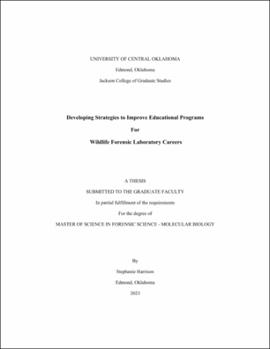| dc.contributor.advisor | Creecy, James | |
| dc.contributor.author | Harrison, Stephanie | |
| dc.date.accessioned | 2023-06-22T19:42:14Z | |
| dc.date.available | 2023-06-22T19:42:14Z | |
| dc.date.issued | 2023 | |
| dc.identifier.other | (AlmaMMSId)9982957408902196 | |
| dc.identifier.uri | https://hdl.handle.net/11244/337824 | |
| dc.description.abstract | There is a necessity for wildlife forensic programs to uniformly provide a comprehensive curriculum that includes the requirements desired by employers in the growing field of wildlife forensics. Programs need to be created based on societal needs, industry requirements (Avargil et al., 2020), within accreditation standards, and with a broad enough knowledge base for a shifting job market (Hardy et al., 2021). Programs created hastily based on popular demand can result in graduates unprepared for careers (Welsh et al., 2011). Planning programs around how students select classes (Othman et al., 2019) and improving degree roadmaps can result in financial gains (Su et al., 2019). By determining the requirements for the various wildlife forensic careers, wildlife forensic programs can individualize their programs to best prepare wildlife forensic students. The most current entry level job descriptions for Wildlife Forensic Chemist, Geneticist, and Morphologist, were obtained from the world's most prominent laboratory, The National Fish and Wildlife Forensics Laboratory. Course objectives, lessons, and labs from current University of Central Oklahoma degrees were evaluated to see if and how the knowledge, skill, and ability requirements were met. The results were arranged into tables and requirements that were not met or partially met were identified. This project developed strategies in the form of short, middle, and long-term goals that can be implemented to meet all job requirements for the three wildlife forensic careers looked at in this project. The methods of this project could be used as a template for how to evaluate or develop programs that align with job requirements for respective careers. The job requirements in this study could be used as a guide to create wildlife forensic education standards to standardize wildlife forensic programs. The design of this project along with surveys of students, employers, and employees can be used in future projects to evaluate the effectiveness of other programs at meeting job requirements for respective careers. | |
| dc.rights | All rights reserved by the author, who has granted UCO Chambers Library the non-exclusive right to share this material in its online repositories. Contact UCO Chambers Library's Digital Initiatives Working Group at diwg@uco.edu for the permission policy on the use, reproduction or distribution of this material. | |
| dc.subject.lcsh | Forensic sciences--Study and teaching (Higher) | |
| dc.subject.lcsh | Education, Higher--Evaluation | |
| dc.subject.lcsh | Wildlife crime investigation | |
| dc.title | Developing strategies to improve educational programs for wildlife forensic laboratory careers | en_US |
| dc.type | Academic theses | |
| dc.contributor.committeeMember | King, Chad | |
| dc.contributor.committeeMember | Lord, Wayne | |
| dc.thesis.degree | M.S., Forensic Science-Molecular Biology | |
| dc.subject.keywords | Wildlife forensics | |
| dc.subject.keywords | Degrees | |
| dc.subject.keywords | Education standards | |
| dc.subject.keywords | Job requirements | |
| dc.subject.keywords | Laboratory careers | |
| dc.subject.keywords | Programs | |
| dc.identifier.oclc | (OCoLC)1385364375 | |
| thesis.degree.grantor | Jackson College of Graduate Studies | |
